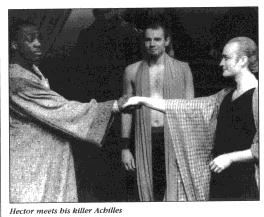 Troilus and Cressida
Troilus and Cressidaby William Shakespeare
Reviews, Socialist Review, No.229, April 1999.
Copyright © Socialist Review.
Copied with thanks from the Socialist Review Archive at http://www.lpi.org.uk.
Marked up by Einde O’Callaghan for the Marxists’ Internet Archive.
 Troilus and Cressida
Troilus and Cressida
by William Shakespeare
Troilus and Cressida was for a long time regarded as one of the most enigmatic of Shakespeare’s plays. It has been treated as a comedy; but there is little comedy in an ending marked by betrayal, devastation and death. It cannot easily be treated as a tragedy either. Yet, as this production shows, it is among the most powerful of plays, precisely because it does not fit into the normal categories of drama.
The play is set in the seventh year of the Trojan War and ostensibly centres on the relationship between one of the Trojan princes, Troilus, and Cressida, a Trojan woman whose father has chosen to go over to the Greeks. Troilus is intent on winning Cressida, but she plays hard to get, on the grounds that once a woman has admitted her regard for a man he loses all interest in her. Their relationship is finally consummated in one night of passion, only to be broken apart by a Trojan decision to send her across the Greek lines in exchange for a Trojan prisoner of war. Once in the Greek camp, she ignores her promises to Troilus and turns to the Greek Diomedes, just before bitter fighting breaks out and the Greek Achilles kills one of Troilus’s brothers, Hector.
This outline would not be amiss as a story line for a typical episode of Neighbours – or perhaps, with the death, Brookside. It certainly lacks any true tragic climax. This is why it has sometimes been treated simply as a tale of female untrustworthiness (with Cressida dismissed as ‘a whore’), or of Greek duplicity as against Trojan honour. But Shakespeare was able to use this feeble framework to display, with enormous dramatic intensity, the way in which people are torn apart by contradictory values and feelings.
His underlying theme is that the values they profess do not make sense of what they are doing, but neither do the alternatives on offer. Early on both Troilus and Hector on the Trojan side admit there is no point in fighting a war simply to satisfy Paris’s lust for Helen. ‘Fools on both sides,’ says Troilus, ‘Helen must needs be fair, when with your blood you daily paint her thus.’ There’s no ‘worth’ in keeping Helen, argues Hector, since every ‘soul’ lost in the war ‘hath been as dear as Helen’. Yet both then go on to insist that ‘honour’ demands that they proceed with the war.
Meanwhile, on the Greek side, Ulysses bemoans the loss of the conservative values of hierarchy and station. Without these, he says, society is undermined, force decides what is right, and ‘chaos ... follows the choking of degree’. Yet from this point on, all his actions involve deception designed to bring about the crudest use of force, until he goads Achilles into killing an unarmed Hector.
Tragedies like Hamlet and Macbeth centre on individuals driven by their own personal traits to destruction. This play, by contrast, shows societies driven by the possession of contradictory values to tear at each other over a pointless issue (the possession of Helen), and, in the process, to tear down all values. Hector pays the price – and so do whatever genuine feelings Troilus and Cressida had for each other. The tragedy comes from the dialectic of social contradiction, not of individual destiny.
The values in question are not abstract values. They correspond precisely to the two world views that clashed right across Europe as Shakespeare wrote the play at the beginning of the 17th century. On the one hand was the notion of society as based on feudal notions of hierarchy, order and honour – brilliantly put across by Ulysses in a speech which deploys the Aristotelean-Ptolemaic picture of the ordered heavens to defend it. On the other was the capitalist notion of value as dependent on worth in buying and selling – as when Hector discusses how to measure the value of Helen. Soon after Shakespeare’s death the clash was to produce a Thirty Years’ War in Europe every bit as destructive as the ten year Trojan War, and led to revolution in Shakespeare’s own England. The power of their juxtaposition comes in the way those clashes shaped our own society and its presuppositions.
One final point. Director Trevor Nunn and the National Theatre have put on the play without star actors (many of them commonly appear in The Bill). But there are many star performances. The cast brings the play to life marvellously – and show, in a haunting ending, the horrors that result when the contradictions in a society cannot be resolved.
Troilus and Cressida plays at the National Theatre, London, throughout April and May
Last updated on 21 December 2009